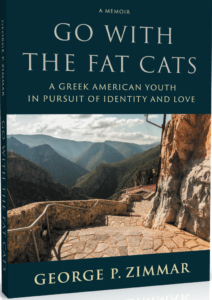 Briarcliff Manor resident George Zimmar’s memoir, “Go With the Fat Cats: A Greek American Youth in Pursuit of Identity and Love,” reveals the author’s search for a better life, mutual love, and rich intellectual learning while growing up in his father’s home.
Briarcliff Manor resident George Zimmar’s memoir, “Go With the Fat Cats: A Greek American Youth in Pursuit of Identity and Love,” reveals the author’s search for a better life, mutual love, and rich intellectual learning while growing up in his father’s home.
In 1960s Chicago, the teenager struggles with his ethnic identity. Is he Greek or American? He wants to honor his heritage and his strict father, but the pull of American girls and the American way of life are too strong to ignore.
“Go with the fat cats!” were the words of his college advisor as he joined a prestigious medical research center to make his way in life as a college professor from his origins as a soda jerk in a family-owned sweet shop.
For his struggling family, the fat cats were those with more education, more security, more well-being, more assets, more integration into the American way of life. Succeeding in whatever they did was a reality that immigrants endeavored to achieve if not for themselves, for their children in mid-century America.
The contrast of the social and cultural milieus between the 1950s and 1960s revealed the fault lines of American society, writes Zimmar, an adjunct senior professor of psychology at Pace University.
The 1960s marked a turning away from the relative stability of cultural values and religious beliefs of the 1950s to the turmoil of social change, distractions to personal achievement, and decline of religion that followed.
“Go With the Fat Cats” marks this period in the author’s life as he grapples with the unconscious need to be both part of and apart from the ethnic group into which he was born — a dual mentality that succors and conflicts the persona.
The book can be ordered on Amazon or Barnes and Noble.






